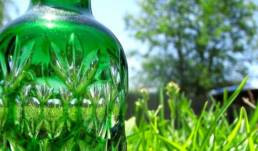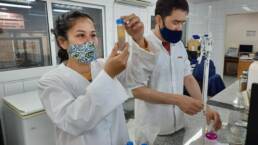La Universidad de Lima articula esfuerzos de actores regionales e internacionales para elaborar alimentos funcionales a partir de subproductos de la industria pesquera.
La desnutrición infantil impacta negativamente en el desarrollo de niños y niñas, pues disminuye sus capacidades cognitivas y su estado de salud (Fondo de las Naciones Unidas para la Infancia, 2019). En el Perú, el 12,2 % de niños y niñas menores de 5 años presenta problemas de desnutrición. Esta situación se agudiza en la región Piura, donde esta cifra representa al 13,1 % de la población infantil (Instituto Nacional de Estadística e Informática, 2019).
El Centro de Estudios e Innovación de Alimentos Funcionales (CEIAF) de la Universidad de Lima busca responder a esta problemática con el proyecto “Revalorización de péptidos bioactivos de residuos de productos hidrobiológicos para contribuir a la disminución de la desnutrición infantil y al incremento de la competitividad de la industria pesquera de la bahía de Sechura, Piura”. Este proyecto busca desarrollar alimentos funcionales a partir de péptidos bioactivos obtenidos de los subproductos de las conchas de abanico, con el objetivo de disminuir la desnutrición infantil del país. El carácter global de este reto llevó al CEIAF a incorporar en el proyecto a investigadores del Instituto de la Grasa (CSIC) de Sevilla, España, con el cual tiene un convenio institucional. Asimismo, CEIAF articuló los esfuerzos de actores locales, tanto del sector público por medio del Ministerio de la Producción (PNIPA), como del sector privado, en el que encontró la colaboración de la empresa Gam Corp. S. A. La coordinación del proyecto está a cargo de la doctora Nancy Chasquibol Silva.
Este proyecto forma parte de un conjunto de iniciativas de investigación e innovación vinculadas con garantizar la seguridad alimentaria y la nutrición de la población, y que además apuestan por la sostenibilidad de los biorrecursos (Organización de las Naciones Unidas para la Alimentación y la Agricultura, 2017). Estos retos y objetivos han sido integrados en el foco estratégico Sistemas Alimentarios Sostenibles, el cual constituye un área de especialización identificada por la Universidad en el marco del proyecto Erasmus+ I2LATAM. De este modo, a partir de una metodología para analizar las capacidades de I+D+i, la Universidad busca responder a las necesidades globales, nacionales y regionales relacionadas con la alimentación.
En este sentido, I2LATAM colaborará para articular proyectos como este con una agenda científica, la cual permitirá el desarrollo de aquellas áreas de fortaleza científico-técnica de la institución.
Estos retos y objetivos han sido integrados en el foco estratégico Sistemas Alimentarios Sostenibles, el cual constituye un área de especialización identificada por la Universidad en el marco del proyecto Erasmus+ I2LATAM.


